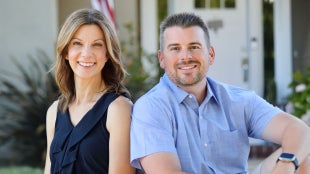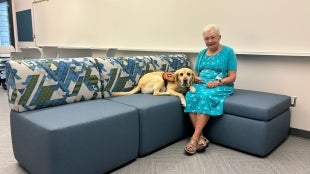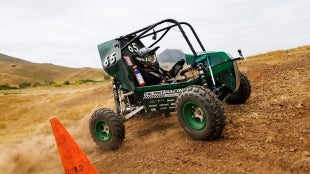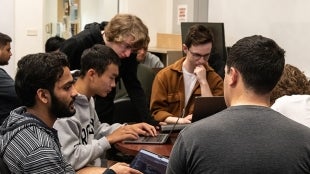A Shop Where Mustangs Can Learn and Earn

The Cal Poly College of Engineering operates two campus machine shops, Mustang '60 and the Aero Hangar, that are free resources for the Cal Poly community. These shops house a variety of hand and power tools, as well as different metal- and wood-cutting machines, including saws, routers, mills, lathes, water jets, laser cutters and 3D printers. While no classes are taught in these shops, they are key resources that exist in support of classes, campus clubs, senior projects and even personal endeavors. At any given time, there could be upwards of 5,000 people on campus who have undergone the necessary training to use the shops during regular hours.
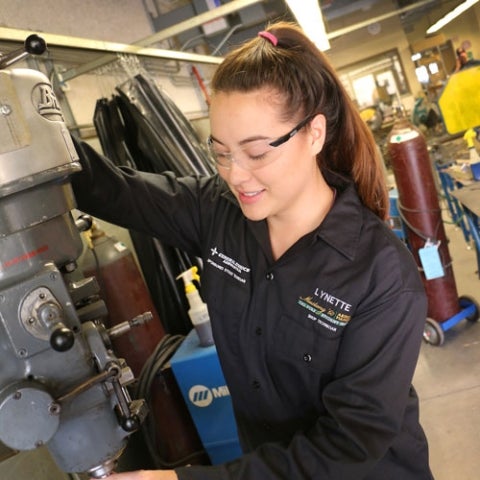
Like most things at Cal Poly, these shops are very student-centric to allow for as much hands-on practical experience as possible. With the exception of two full-time staff managers, Eric Pulse (Mechanical Engineering, '05) and Jim Cullins, the shops are 100% student run, with students hired on as shop techs and supervisors to keep the daily operations running smoothly.
Pulse is the shop manager of Mustang '60. He was a student shop tech 20 years ago and was brought back in 2008 to help outfit and operate the Mustang '60 shop. "When I was a student, there were eight shop techs running the Aero Hangar five to six days a week, with one full-time shop manager," he said. "Now at our peak, we have around 53 paid student shop techs."
Student shop techs are hired as rookies after their freshmen year, and each year, with more experience, they get more responsibilities, including key and card access to the shop and a raise when they achieve senior level shop tech status. Additionally, they can apply for one of the 13 or 14 student supervisor positions, which also comes with a pay raise.
"The whole promotion process is self-perpetuating," Pulse said. "The way that someone gets promoted is that they have to learn new things in the shop, and they have to help evaluate and train other people. In order for someone to move up, they have to not only complete their own accomplishments, they have to sign off on someone else's accomplishments as well."
Mechanical engineering student Rose McCarver is the shop's operations and outreach supervisor. "One of the cool things about the shop being student-run is there are a range of supervisor positions, so employees can step up and help with the management side of things or take on special roles and responsibilities," she said.
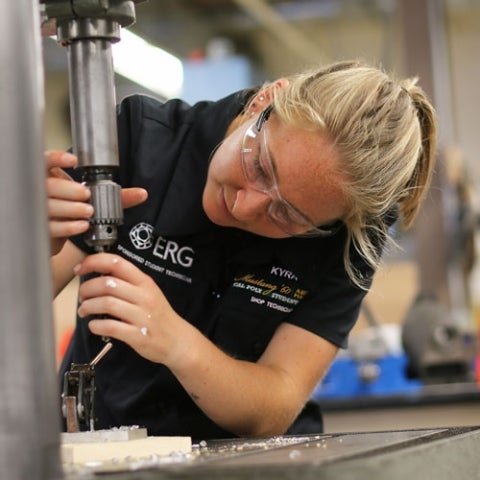
To help offset the cost of these positions, many shop techs have a corporate sponsor that contributes to the shop tech's pay and the cost of running the shop. The shop currently has 30 sponsors, with the ultimate goal of having each student worker matched up with one. Sponsors get their name on the shop wall and a dedicated shop tech who wears their corporate logo on their shirt.
"A cool thing about the corporate sponsorships is that shop techs get to hear more about their company and see if they have any internships. They also get an opportunity to interact with someone they might potentially want to work for," McCarver said. "We try to match the shop techs with corporate sponsors according to the students’ interests."
One of those corporate sponsors is Plastikon, a plastic injection contract manufacturer based in Hayward, California, with 3,000 employees worldwide. Cal Poly alumnus Guiv Soofer (Industrial Engineering, '97) is Plastikon's executive vice president of manufacturing.
"I received an amazing education at Cal Poly," Soofer said. "I always felt a connection to the school, so when I graduated, I wanted to give back to the university. As we grew as a company, I had more opportunities to be able to donate through the company as well."
Soofer sees giving back to his alma mater as a win both personally and professionally. "I've always donated to the school, but it also makes sense for our company to be able to directly donate to this program,” he said.
He knows the value that a Cal Poly education can add to his company's overall success. "We usually hire out of Cal Poly, so most of my team in the manufacturing engineering group are Cal Poly graduates. I know what to expect from them and how to push them in the right direction. They're not afraid to get their hands dirty, which is not what we've found at other universities."
Ultimately, these corporate sponsors and their student shop techs both receive something valuable out of this relationship. The students receive hands-on training in the shop and gain potential employer contacts for when they graduate, and companies receive a pipeline of potential talent with whom they can establish relationships. As Soofer states, “Our hope is we make a connection where we get to know the student worker and eventually bring that student into our facility."

